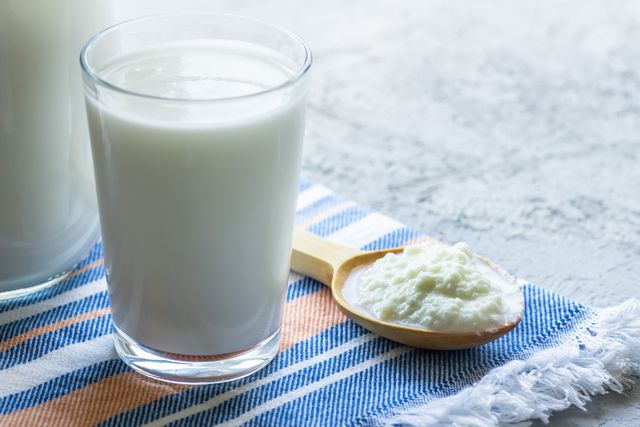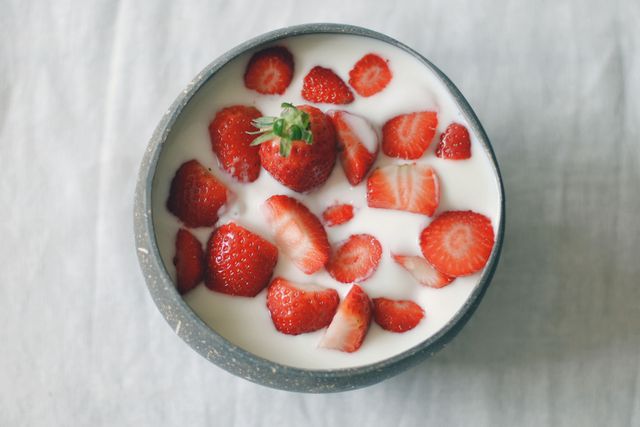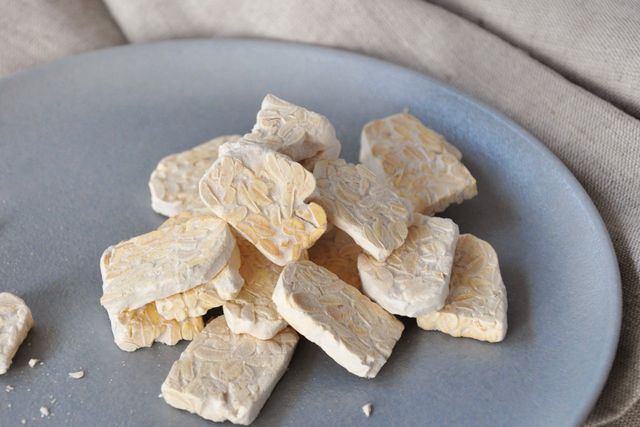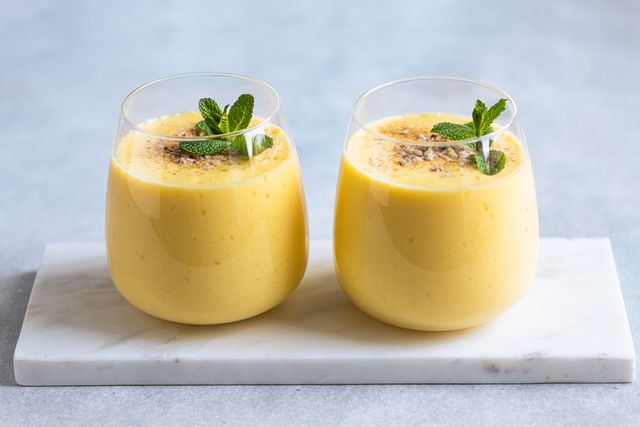5 Foods With More Gut Health Benefits Than Sauerkraut
Medically reviewed by Sohaib Imtiaz, MD
Sauerkraut, made with fermented cabbage, is known for its gut-friendly benefits. However, other fermented foods may offer as much, if not more, gut health benefits thanks to higher probiotic counts, a wider variety of species, or other helpful nutrients and compounds.
1. Kefir

Kefir is a tangy,
fermented dairy drink
that may offer more gut benefits than other fermented foods, including sauerkraut. It’s made by adding
kefir grains
(a mix of bacteria and yeast) to milk, resulting in a drink that can contain up to 50 different species of bacteria and yeast.
Kefir is uniquely rich in species such as
Lactobacillus kefiranofaciens
and
Lactobacillus kefiri
as well as yeasts such as
Saccharomyces cerevisiae
and
Kluyveromyces marxianus.
Thanks to this, kefir may help
boost beneficial gut bacteria
,
improve microbial balance
, and support digestion.
Kefir is also a good source of protein (about 10 grams per serving),
B vitamins
,
calcium
, magnesium, and other nutrients. On top of that, it contains
bioactive peptides
formed during fermentation, which may offer
antioxidant
effects,
support immune health
, and
help regulate blood pressure
.
2. Kimchi

Kimchi is a tangy, spicy dish made by fermenting vegetables like cabbage and radishes with spices. It shares some bacterial species with sauerkraut, like
Leuconostoc mesenteroides
, but it also contains others such as
Lactobacillus sakei
and
Weissella koreensis
, giving it a broad probiotic profile.
Kimchi supports gut health by increasing
microbial diversity
, which is key to a
resilient gut microbiome
. Because it’s made from vegetables, it also has fiber, vitamins, minerals, and antioxidants. The fiber acts as a
prebiotic
, helping feed the good bacteria already living in your gut.
Regularly eating kimchi has been linked to
improved digestion
, immune function, and even heart health.
3. Yogurt

Yogurt
is one of the
most well-known probiotic foods
, made by fermenting milk with bacteria, such as
Streptococcus thermophilus
and
Lactobacillus delbrueckii.
Many yogurts also include added strains such as
Lactobacillus acidophilus
and
Bifidobacterium animalis,
which may offer extra gut support.
These probiotics may help
balance gut bacteria
, improve digestion, and reduce symptoms of
irritable bowel syndrome (IBS)
, like bloating, constipation, or diarrhea. Yogurt also supports those with
lactose intolerance
, as the fermentation process breaks down much of the lactose, making it easier to digest.
In addition to probiotics, yogurt is rich in protein, calcium, potassium, phosphorus, and vitamins A, B2, and B12—making it a well-rounded choice for your gut and overall health.
4. Tempeh

Tempeh is made by fermenting soybeans, resulting in a firm, cake-like texture. What makes it unique is that it’s fermented using fungi—specifically
Rhizopus oligosporus
species—as well as beneficial bacteria like
Lactobacillus plantarum
,
Lactobacillus fermentum
, and
Lactobacillus brevis.
Tempeh is high in
fiber
, which feeds good gut bacteria, and its probiotics may help
support a healthy microbiome
. Its impressive
protein content
and plant-based nutrients make it a popular choice for vegetarians and vegans.
Tempeh may also reduce inflammation and act as an antioxidant, further supporting gut and immune health.
5. Lassi

Lassi is a traditional Indian drink made from yogurt and often blended with fruit or spices like cardamom. Like yogurt, it contains several potential health-promoting probiotics such as
Streptococcus thermophilus
and
Lactobacillus helveticus.
Lassi is especially helpful for digestion and may be easier to tolerate for people who are lactose intolerant, thanks to the fermentation process.
It’s been linked to gut health benefits like reduced IBS symptoms. And it also shows potential support for heart health, blood sugar control, and immune function.
What This Means For You
Sauerkraut is a great source of gut-friendly probiotics, but it’s just one piece of the puzzle. Kefir, kimchi, yogurt, tempeh, and lassi bring something unique to the table—from a greater variety of probiotic species to added fiber, protein, and anti-inflammatory compounds.
Read the original article on
Verywell Health





